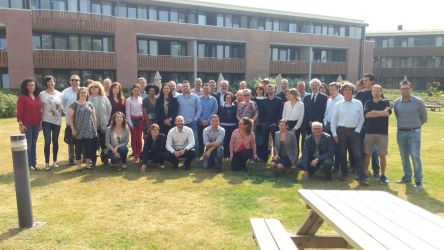The scientific team of the European Diverfarming project take stock of its first year in Ameland (Netherlands)
Around 60 members of Diverfarming are meeting in Ameland (Netherlands) from today until Thursday 31st May to hold the Annual General Meeting of this project financed by the Horizon 2020 programme of the European Commission.
 The change in paradigm in European Union agriculture posed by Diverfarming has now been in progress for one year and thus the need to take stock of the first steps undertaken and to draw up the future lines. This is materialised in an agenda full of meetings and working meetings from which crop diversification can be strengthened and, above all, to be closer to the European agricultural community.
The change in paradigm in European Union agriculture posed by Diverfarming has now been in progress for one year and thus the need to take stock of the first steps undertaken and to draw up the future lines. This is materialised in an agenda full of meetings and working meetings from which crop diversification can be strengthened and, above all, to be closer to the European agricultural community.
Following the joint inauguration by the Universidad Politécnica de Cartagena, general coordinator of the project, and the University of Wageningen, organiser of the event, the Consultative Board will be presented which has been completed in the last months. This organism is a space of governmental institutions that will guide the project’s actions in matters pertaining to agrarian policies and which is composed of representatives from the Junta de Andalucía, the University of Milan, the Helmholtz centre of Munich and, European organisms representing farmers and the agricultural sector, COPA – COCEGA.
In the first twelve months of work, the scientific team has worked in the search for the best combinations of diversification for each geographic zone and climate characteristics, resulting in a European diversification map which, additionally, has been a consensus with the farmers from each region, through specific meetings. The balance regarding the results obtained to date in the lands of the case studies have already been posed, such as the case of mandarins with capers in Murcia or vineyards with aromatic plants in Germany, will occupy a major part of these workdays. The Andalusian olive groves will also have their place on the agenda, in the person of Beatriz Lozano, professor at the Universidad de Córdoba and leader of the South Mediterranean region, who is responsible for showing the evolution of the diversification in this crop.
The participation of farmers and end users is one of the lines that Diverfarming considers. To do so, the communication strategy led by the Unidad de Cultura Científica at the Universidad de Córdoba becomes essential to achieve the involvement of all the European agricultural community. In this sense, the coordinator Elena Lázaro Real will take stock of the achievements in this matter and will present a package of actions specifically directed at the farmers of Europe who will ultimately be those who adopt the crop diversification.
Rural development and the fight against depopulation by means of anchoring the youngest population thanks to job creation, which brings with it the diversification of crops or the increase in the biodiversity that in recent years is being endangered, are some of the objectives of Diverfarming with the greatest social repercussion, and which therefore will also be covered at this first annual meeting.










